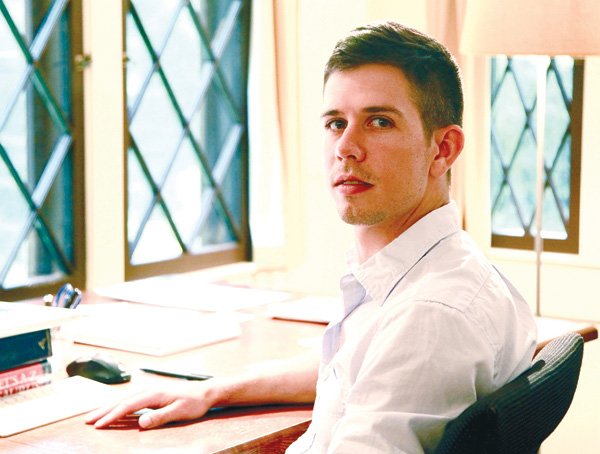Playwright Stephen Karam says it just might be “the best of both worlds.”
Karam, a Pulitzer Prize finalist for his dark comedy “Sons of the Prophet,” is talking about the idea of audiences reading a play and hearing the playwright speak before they see the show. It’s something new in Northwest Arkansas, a cooperative effort between the Fayetteville Public Library, where Karam will speak Feb. 2, and TheatreSquared, which will present “Sons of the Prophet” Feb. 15-March 3.
“To my knowledge, this is something really special,” Karam says by phone from New York City. “I’ve never heard of it anywhere else. To have the audience thinking and experiencing the text of the play before they see it adds another dimension.”
“Sometimes, and only rarely, choosing the new season for TheatreSquared is made easier by the emergence of a simply exceptional play,” says Bob Ford, artistic director for TheatreSquared. “‘Sons of the Prophet’ is that play. It is universally acclaimed to be one of the smartest, funniest and deeply felt new works that has been written in this decade - and we agree. I’m thrilled that TheatreSquared and Northwest Arkansas will host the play’s first national production since its New York debut.”
Karam was intimately involved in that first production: His play was commissioned by the Roundabout Theater Company.
“But this production belongs to the director and TheatreSquared,” he says.
“If you see a play’s first production, you get a goodidea of what the author is thinking. But every other group makes it entirely their own without that author involvement.
“If someone is enterprising enough to read the script, it’s the best of both worlds.
You can take the journey via the text, then go and see it, and you’ll gain great insight into how interpretative an artform theater is. Novels can be read again and again for enjoyment, but plays are literally reinvented every time they’re done.”
Karam, who grew up in a Lebanese-American family in Scranton, Pa., didn’t necessarily intend to become a playwright. He says he fell in love with theater at his sister’s middle-school production of“Little Shop of Horrors” - he was a first- or second-grader, he recalls - and “just fell into playwriting through a love affair with the stage.”
“I wanted to build roller coasters when I was in middle school,” he says, “so I thought maybe I’d become an engineer.
But it became clear in college I wanted theater to be a part of my life in a real way. I had a day job for years until I figuredout how to survive by writing.”
Karam’s big break came in 2007, when the Roundabout Theater in New York built a black-box theater in the sub-basement to debut his “Speech & Debate.” “Sons of the Prophet” moved up to the mainstage in 2011.
The New York Times’ Charles Isherwood described “Sons of the Prophet” as “a play about extreme suffering(that) is also explosively funny.” Karam says he also tells people “it’s a comedy about human suffering. It’s the most accurate description and it sets up expectations appropriately.”
Is it his life story?
“The truth is, it’s a complete work of fiction, so the answer is ‘no.’ But people want to know, is there some semblance of you and the people of your life infused into your work? Who am I but all of my experiences and the people I know and love? I wouldn’t know how to write something that didn’t feel deeply personal. So it’s hugely personal but not autobiographical.
“I would be far too boring on stage.”
Whats Up, Pages 15 on 01/25/2013

